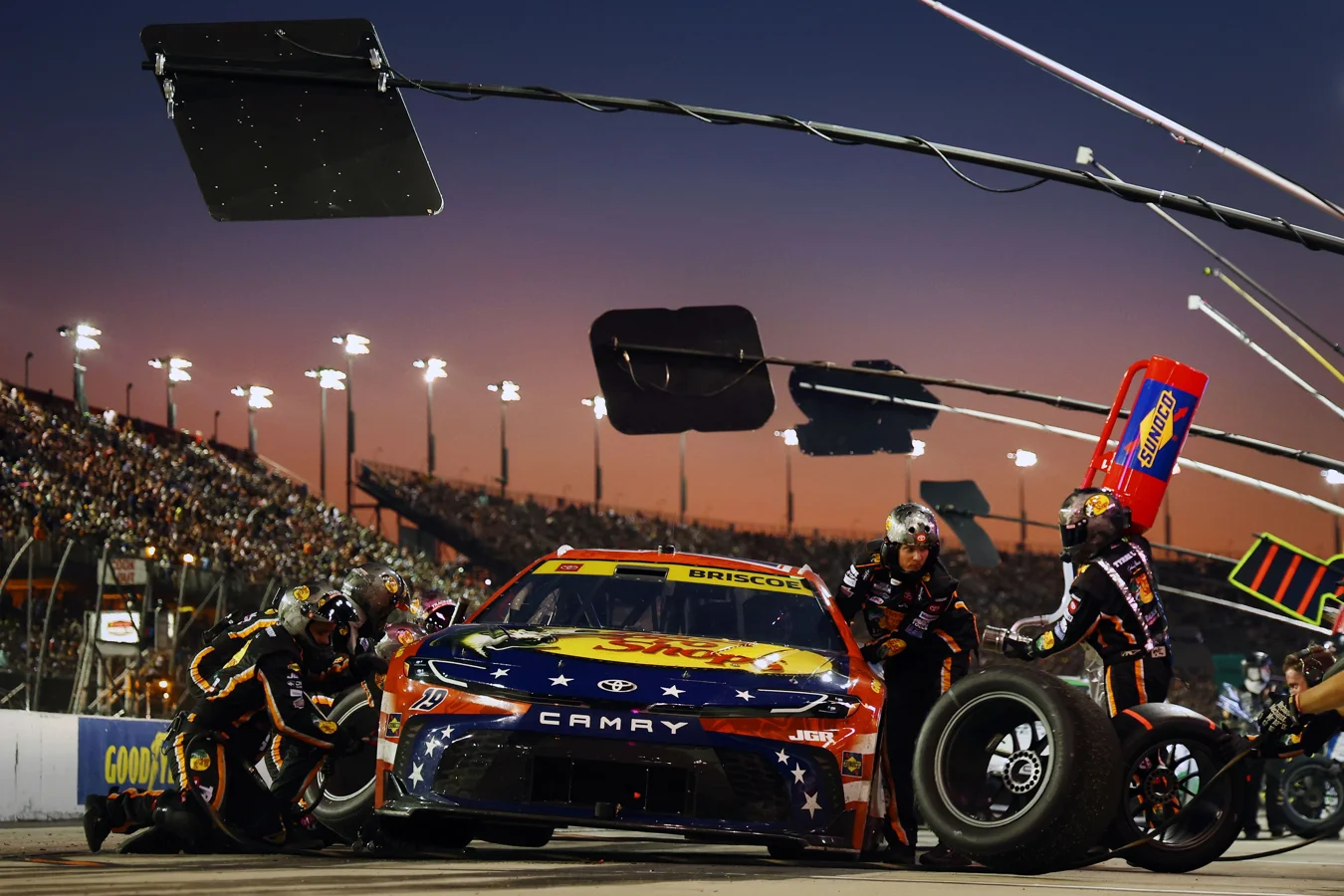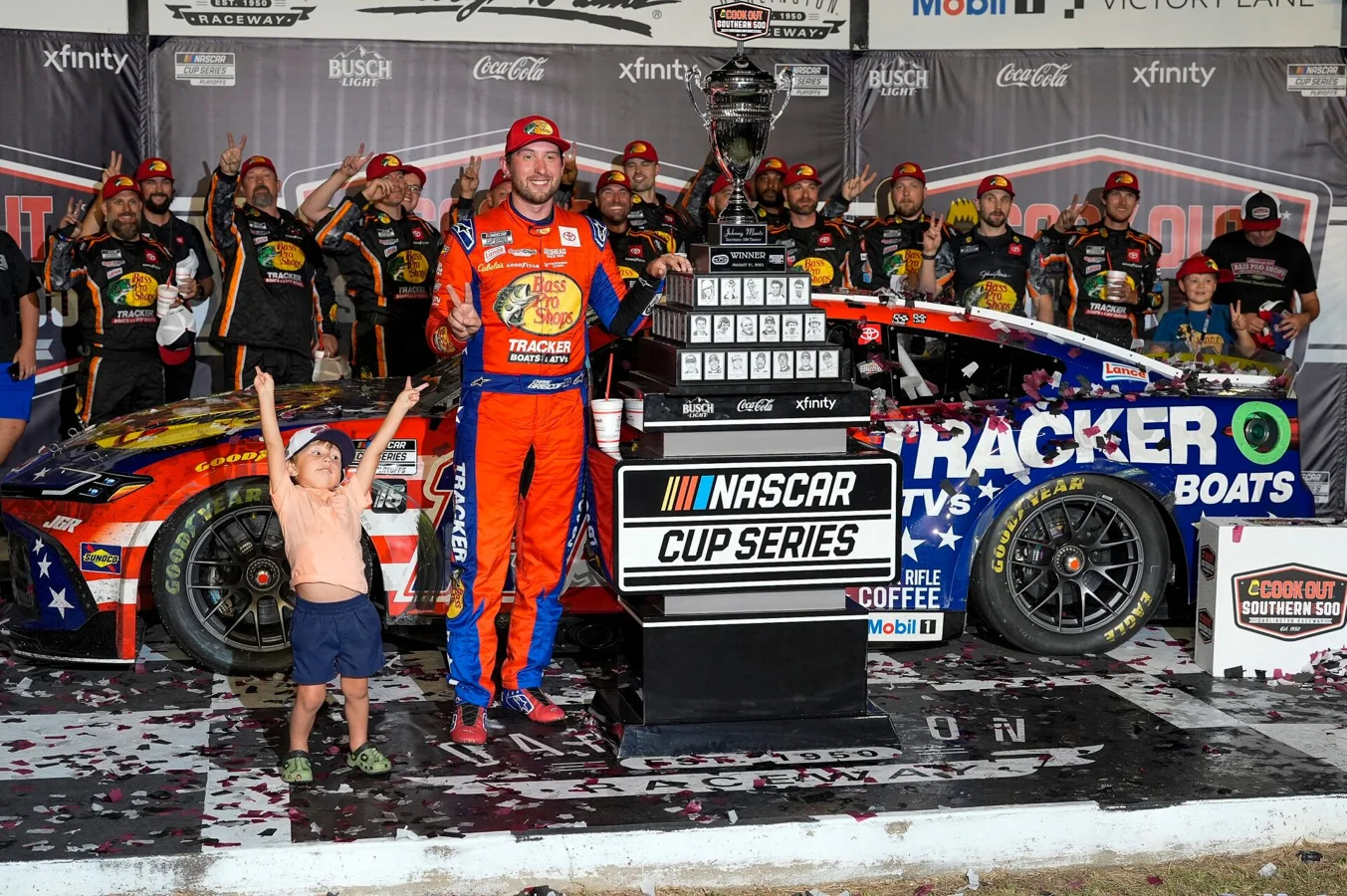Chase Briscoe’s remarkable run at Darlington Raceway in the 2025 Cook Out Southern 500 not only carved a new chapter in NASCAR history but also reignited admiration—bordering on envy—among the sport’s legends, including Rusty Wallace. Briscoe’s Darlington Southern 500 legacy, achieved by a commanding performance that echoed historic dominance and rare adaptability, has quickly become a focal point in the NASCAR Cup Series playoffs spotlight.
On August 31, 2025, Darlington Raceway hosted the opening race of the Cup Series playoffs, famously known as The Track Too Tough to Tame. Behind the wheel of the No. 19 toyota/”>Toyota for Joe Gibbs Racing, Chase Briscoe delivered a performance for the ages, leading 309 out of 367 laps. This level of control at the storied Labor Day event has not been seen since Richard Petty’s iconic 1966 run, underscoring the significance of Briscoe’s back-to-back Southern 500 victories. Briscoe celebrated in victory lane, stating,
“So cool to win two Southern 500s in a row. This is my favorite race of the year.”
—Chase Briscoe, Driver No. 19 Toyota, Joe Gibbs Racing
Briscoe’s Reign Ignites Historic Comparisons
The racing community was abuzz with Briscoe’s accomplishment, given how few have managed to both master Darlington’s notorious challenges and secure consecutive Southern 500 wins. The race’s physical demands, including its abrasive surface and unique turns, spotlights drivers who can perform with precision near the wall. Briscoe’s run, marked by nearly 85% of laps led and a car kept unscathed by Darlington’s infamous ‘Lady in Black’ stripes, spotlighted uncommon composure and skill.

Winning back-to-back at Darlington is rare and elevates a driver into rarefied company. The Southern 500, with its legacy stretching back to 1950 as NASCAR’s first superspeedway event, is a crown jewel on the racing calendar, carrying unique prestige and traditionally marking the start of the postseason. Briscoe’s performance didn’t just lock him into the Round of 12; it became a defining narrative for competitors, fans, and analysts alike.
Legends such as Jeff Gordon, who boasts seven Southern 500 wins, and Dale Earnhardt Sr., with nine victories, are measured by their success on this demanding oval. Yet, as the garage digested Briscoe’s win, attention shifted to how drivers from previous generations—some with Hall of Fame resumes—responded to the milestone.
Rusty Wallace Reflects on Missed Glory
Rusty Wallace, a NASCAR Hall of Famer with a storied record at Darlington—11 top-five finishes and six spring event wins—offered his perspective on the magnitude of Briscoe’s accomplishment. On the NASCAR LIVE podcast, Wallace lauded the young driver for his mastery of the famously punishing course.
“It was a hell of a performance. He just didn’t get lucky at anything. He just dominated the entire week,”
Wallace said, referencing Briscoe’s speed from qualifying through every grueling mile. —Rusty Wallace, NASCAR Hall of Famer
Despite Wallace’s glittering Cup Series career, including a championship in 1989 and 55 overall victories, the Southern 500 trophy always eluded him. He came closest with second-place finishes in the late 1980s but never captured the grand prize of the fall classic. Wallace explained,
“I mean, now to win two Southern 500s back to back, that’s pretty strong. I wish I could do something like that. I’ve done that on the short track series, you know, winning short tracks back-to-back, but Southern 500s, that’s the one I wish I could have won,”
exposing a candid sense of longing matched by deep respect. —Rusty Wallace, NASCAR Hall of Famer
Wallace’s prowess on mile-long tracks like Dover International Speedway was legendary, with back-to-back wins in both spring and fall races during the early 1990s. However, Darlington’s extended distance, tire abrasion, and the tactical complexity of the Southern 500 presented a test that even he acknowledged as unique. For Wallace and many peers, missing out on the fall classic’s crown jewel status leaves a lingering sense of what might have been—especially when watching newer talents like Briscoe adapt and conquer, even as the technical landscape evolves with changes like the Next Gen car.
Kyle Petty Analyzes Briscoe’s Adaptability Across Teams
Briscoe’s consecutive Southern 500 victories are not only notable for their timing but also for the manner in which he achieved them. NASCAR analyst and former driver Kyle Petty offered insight into the difficulty of notching back-to-back wins at Darlington, particularly across different teams and manufacturers.
“Chase Briscoe did it with two teams, Stewart-Haas Racing and Joe Gibbs Racing. Chase Briscoe did it with two manufacturers, with Ford and with Toyota. Chase Briscoe did it with two different crew chiefs, two different pit crews, two different everything. He did something that no one else has ever done,”
Petty said, capturing just how unprecedented this accomplishment is in modern NASCAR history. —Kyle Petty, NASCAR Analyst
This level of adaptability stands out against a historical backdrop where switching teams, cars, and pit crews has tripped up even the sport’s most talented drivers. Briscoe’s shift from Stewart-Haas Racing’s No. 14 Ford in 2024 to Joe Gibbs Racing’s No. 19 Toyota in 2025 required acclimation to new engineering philosophies and on-the-fly strategic calls, yet he continued his winning ways under immense postseason pressure.
Kyle Petty reflected on how Briscoe’s repeat compares to prior legends, arguing,
“I look at this as one of the greatest back-to-backs ever. And I think, I am going to say this, that it’s harder to do it today than it’s ever been,”
pointing to the high degree of competition and parity within today’s Cup Series. —Kyle Petty, NASCAR Analyst
The Southern 500 has seen its share of repeat winners in past decades, but those were often during eras when only a small number of teams had the resources to win consistently. As Petty remarked,
“That was tough, but, at the same time, there were only six or seven guys who could win. When we look at this right now, there have been so many winners in the past twenty years who haven’t been able to go back-to-back,”
putting Briscoe’s achievement in sharp relief. —Kyle Petty, NASCAR Analyst
Since Greg Biffle completed a Southern 500 repeat nearly two decades prior, only a handful of stars—such as Denny Hamlin, who has won four times at Darlington without consecutive victories—have contended for similar records. Briscoe’s ability to sweep stages and control the race in 2025 stands as a signature accomplishment, highlighting a blend of consistency and versatility that few can match amid the chaos of playoff racing.
The Broader Impact of Briscoe’s Southern 500 Streak
While Briscoe’s achievement occupied headlines, its resonance within the garage and among fans speaks to a broader shift in how NASCAR’s enduring challenges and emerging talents shape the sport. The Southern 500’s legacy—crowned by names like Cale Yarborough and measured by its unforgiving nature—now includes Briscoe’s unmatched adaptability and calm under pressure.
For Rusty Wallace, watching Briscoe claim what long eluded him is both a testament to the young driver’s capability and a reminder of the fleeting opportunities at stock car racing’s most storied venues. Kyle Petty’s analysis draws a clear line from the sport’s history to its rapidly evolving present, where team transitions, new car designs, and fierce parity raise the bar for all contenders. Briscoe’s legacy at Darlington now serves as inspiration and sets a new benchmark for what it truly means to tame
“The Track Too Tough to Tame.”
Heading deeper into the NASCAR Cup Series playoffs, the impact of Briscoe’s run is likely to ripple through both the championship chase and the aspirations of emerging drivers. As the Darlington Southern 500 legacy continues to grow, it remains a measure by which greatness is defined—and envied—even by champions like Rusty Wallace.
